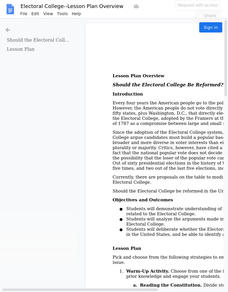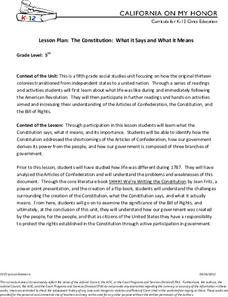C-SPAN
Electoral College
Most people are surprised to learn that American democracy is not as direct as they thought. Using a package of guiding questions, charts and curated videos, learners unpack the unique American institution of the Electoral College. The...
C-SPAN
14th Amendment Equal Protection Clause
Two Supreme Court cases, Plessy v. Ferguson and Brown v. Board of Education take center stage in a lesson about the Equal Protection Clause of the 14th Amendment. Class members research both cases to compare and contrast the rulings.
C-SPAN
Middle School Checks and Balances
Seven video clips reveal how the checks and balances built into the constitutional framework of the United states' government are designed to keep any one branch from becoming too powerful. After watching each clip, groups identify the...
Constitutional Rights Foundation
What Is Constitutional Democracy?
Rediscover the values at the heart of American democracy and what makes it unique with your pupils. Use a reading and discussion questions—in addition to an analytical activity—on the preamble to the Constitution. An additional activity...
Constitutional Rights Foundation
The Emoluments Clause and the President
While the Emoluments Clause didn't get a lot of attention before the 2016 election, all eyes have been on this short phrase in the Constitution with the election of Donald Trump. As a business owner, do his financial interests conflict...
Constitutional Rights Foundation
The Troubled Elections of 1796 and 1800
Congress does more than create new laws. Political scientists delve into the elections of 1796 and 1800 to understand how political parties, the Electoral College, and personal agendas affected the election process. The resource also...
Constitutional Rights Foundation
Elections, Money, and the First Amendment
Those who spend the most, win. Academics read informational text, participate in group discussion, and defend campaign reforms to understand the correlation between money, the First Amendment, and election results. The resource explains...
Constitutional Rights Foundation
Purged From the Voter Rolls: Husted v. A. Philip Randolph Institute
Once a registered voter isn't always a registered voter. Academics explore the topic of voter registration and hindrances to remaining registered. The resource focuses on data analysis, federal voter registration law, and Supreme Court...
Constitutional Rights Foundation
Slavery and the Electoral College
How did slavery mold the creation of the US Constitution? The final lesson in the series focuses on how slavery impacted the creation of the Electoral College. Academics learn how the Electoral College was created because Southern states...
Constitutional Rights Foundation
270 Votes to Win: The Electoral College in the United States
What exactly is the Electoral College and how does it work? The lesson is part of a larger series on government that explains what the Electoral College is and how it helps determine an election winner. Academics participate in...
Constitutional Rights Foundation
The Census in US History
The census has been a part of the American landscape since the Constitution was written; however, it does have a history of controversy. Class members use a guided reading and simulation activity on developing census questions to...
US Department of Commerce
Apportionment: Grades 3-4
Apportionment is a big word for young pupils. Use a helpful cartoon video and worksheet with data set to help them understand how the census fuels representative democracy. After examining how the census determines the number of seats a...
US Department of Commerce
Featured Activity: City Planning With Census Data
What's more important ... an ice cream store or a police station? How about a school or a hospital? Using a simulation game, pupils allot resources as the federal government would based on the census. Discussion questions round out the...
US Department of Commerce
The Census Questionnaire: Then and Now
As the United States has changed, so has the census! While required by the Constitution, the questions the government asks to allot representation and federal funding has developed over time. Using images of previous censuses, young...
US Department of Commerce
Apportionment: Grades 7-8
One person, one voice ... right? Using a simulation where uneven groups are given the same voice, scholars discover why fair apportionment based on an accurate census is important. Once finished, they use actual data to consider what...
US Department of Commerce
Featured Activity: How the Census Impacts My Community
Individuals have $50,000 to spend on a program at their schools—what will they do with the money? After looking at the Constitutional mandate, learners use a census simulation activity to consider the question. After conducting their own...
Judicial Branch of California
Articles of Confederation…Well, They Were Trying!
Different currencies, multiple armies, unreliable protection from thieves: class members experience these challenges playing a game that demonstrates life under the Articles of Confederation. After playing the game—which takes them on a...
Judicial Branch of California
Protecting our Freedoms: The Bill of Rights
Take to the stage! Integrate both drama and civic skills by asking pupils to create and perform skills that demonstrate the importance of the amendments in the Bill of Rights. After reviewing the Preamble to the Constitution, learners...
Judicial Branch of California
Planet Fourth Grade is Researching the U.S. Constitution
Using the Constitutional Convention as a model, learners create their own governments. Other activities to explore the American Constitution include creating posters to help explain the Bill of Rights.
Judicial Branch of California
The Constitution: What It Says and What It Means
Learners get the chance to act as representatives to the Constitution Convention, and must decide whether or not to recommend your state ratify the new framework. After examining the Constitution line-by-line, they consider their...
Judicial Branch of California
Constitution Hall of Fame
Using a tableau activity, class members consider who they want to include in a Hall of Fame to honor the framer of the Constitution. Other activities include using a tableau to act out the various sections of the Constitution and related...
Judicial Branch of California
Fayette v. Take Two: The First Amendment
An informative lesson provides scholars the opportunity to study a Supreme Court case regarding the First Amendment and make a ruling with the members of their group. Class members also participate in group discussion and prepare a...
Stanford University
Prohibition
Prohibition banned the selling of alcohol in America—but why? Designed for high school pupils, the lesson explores the causes of Prohibition including the Temperance Movement. The lesson pairs a PowerPoint presentation with worksheets...
EngageNY
Determining Central Ideas: The 14th Amendment
What is the central idea of the Fourteenth Amendment? Scholars attempt to answer the question as they read and discuss the Fourteenth Amendment to the United States Constitution, which guarantees all citizens equal protection of the...

























